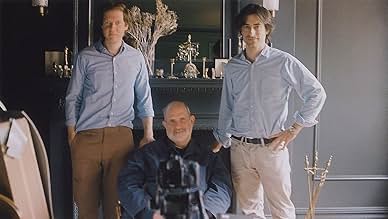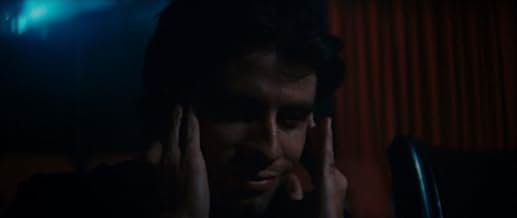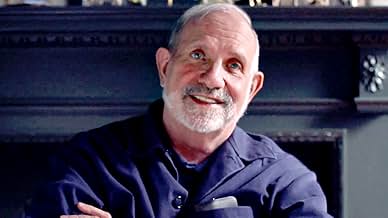IMDb RATING
7.4/10
6.5K
YOUR RATING
A documentary about writer and director Brian De Palma.A documentary about writer and director Brian De Palma.A documentary about writer and director Brian De Palma.
- Awards
- 1 win & 4 nominations total
Mark Hamill
- Self
- (archive footage)
Amy Irving
- Self
- (archive footage)
Kurt Russell
- Self
- (archive footage)
Sissy Spacek
- Self
- (archive footage)
Steven Spielberg
- Self
- (archive footage)
Angela Bettis
- Carietta 'Carrie' White
- (archive footage)
- (uncredited)
Jill Clayburgh
- Self
- (archive footage)
- (uncredited)
Clarence Clemons
- Self
- (archive footage)
- (uncredited)
William Finley
- Winslow
- (archive footage)
- (uncredited)
- …
Vincent Gardenia
- Doctor Byrd
- (archive footage)
- (uncredited)
Don Harvey
- Clark
- (archive footage)
- (uncredited)
Annette Haven
- Self
- (archive footage)
- (uncredited)
Gale Anne Hurd
- Self
- (archive footage)
- (uncredited)
Holly Johnson
- Singing Nightclub Doorman
- (archive footage)
- (uncredited)
Alan King
- Arthur Ruskin
- (archive footage)
- (uncredited)
Featured reviews
In this film, Noah Baumbach and Jake Paltrow interview one of Hollywood's most polarizing directors in Brian De Palma. De Palma has been praised for his innovative camera techniques and his suspenseful stories but has been criticised for misogyny in his films as well as seemingly ripping of many "Hitchcockian" traits. I am familiar with De Palma's work, although I haven't seen too many of his films apart from his most well known ones (Scarface, Untouchables, Carlito's Way etc.) but this documentary certainly wants me to explore more of his movies. The film is mainly just one shot of De Palma talking to the camera intercut with scenes from many of his movies. He goes into extreme detail about every single one of his movies, whilst occasionally talking about aspects of his personal life.
De Palma is a very interesting character. He's eccentric and funny but also can be arrogant sometimes. However, as a director he is a great storyteller and talks about most of his movies in extremely intricate and interesting detail e.g. how he performed certain shots to how he dealt with many of the different egos on his set. If you're someone who isn't particularly interested in film, you'll probably not find too much enjoyment in this documentary. It really is a documentary for cinephiles (such as myself) or at least people who have some interest in the art of film making. I do sometimes wish the documentary would perhaps tap into more aspects of De Palma's personal life such as his childhood or his relationship with his peers (Scorsese, Spielberg etc.). There are moments when De Palma talks about his childhood and refers to incidents that impacted his voyeuristic style but I wish the movie tapped into more moments like these. One other criticism I also have is perhaps De Palma does tend to talk about certain movies more than other ones. I would've liked for him to go into more detail about some of his more notable failures like Mission to Mars and Passion but De Palma generally just skips over these particular films.
However, if you're a movie fan or Brian De Palma fan( hell, even a detractor) you'll find great enjoyment out of this fascinating documentary about one of Hollywood's most prolific directors.
De Palma is a very interesting character. He's eccentric and funny but also can be arrogant sometimes. However, as a director he is a great storyteller and talks about most of his movies in extremely intricate and interesting detail e.g. how he performed certain shots to how he dealt with many of the different egos on his set. If you're someone who isn't particularly interested in film, you'll probably not find too much enjoyment in this documentary. It really is a documentary for cinephiles (such as myself) or at least people who have some interest in the art of film making. I do sometimes wish the documentary would perhaps tap into more aspects of De Palma's personal life such as his childhood or his relationship with his peers (Scorsese, Spielberg etc.). There are moments when De Palma talks about his childhood and refers to incidents that impacted his voyeuristic style but I wish the movie tapped into more moments like these. One other criticism I also have is perhaps De Palma does tend to talk about certain movies more than other ones. I would've liked for him to go into more detail about some of his more notable failures like Mission to Mars and Passion but De Palma generally just skips over these particular films.
However, if you're a movie fan or Brian De Palma fan( hell, even a detractor) you'll find great enjoyment out of this fascinating documentary about one of Hollywood's most prolific directors.
Greetings again from the darkness. A self-inflicted career retrospective
that's my most fitting description of this project from co-directors Noah Baumbach and Jake Paltrow. Rather than line-up a slew of third-party observers and collaborators, we get the famed director himself walking us film-by-film through his resume. That's right, Brian De Palma discusses the De Palma film canon
and we movie lovers couldn't ask for anything better.
Beginning with a clip of Vertigo, the doc leads with the Hitchcock influence, almost as a form of disclosure. It's as if everyone associated is saying, Yes we admit it Director De Palma has been heavily influenced and inspired by the works of Alfred Hitchcock. Now pay attention to what he's done with his career – some really good, some not so good, some downright awful. "Underappreciated" might be the best label for De Palma. He was part of the "New Hollywood" with Spielberg, Scorcese, Coppola, and Lucas, yet they are worshiped, while De Palma is mostly ignored.
Mr. De Palma speaks directly to the camera and seems to thoroughly enjoy this opportunity to analyze (and at times defend) his career, providing a self guided reflective approach - a chronological retrospective that doesn't shy away from his inability to put together a streak of successful films. This is direct talk (describing a particular bomb as "one of many disasters") with no apologies from a filmmaker who has worked for five decades. He tells behind the scenes stories in a matter-of-fact manner, not always complimentary of himself, actors or the industry.
The stories and recollections are the highlight here. De Palma speaks highly of Wilford Leach (his mentor and professor at Sarah Lawrence), composer Bernard Hermann and Robert DeNiro, with less than flattering tales of Cliff Robertson (Obsession), Sean Penn (Casualties of War), and Oliver Stone (Scarface). It's fascinating to hear De Palma explain the box office failure of his version of The Bonfire of the Vanities, address the scandal of Body Double, and describe in detail the simultaneous casting (with Spielberg) of Star Wars and Carrie. Even more eye-opening is his reminiscing on the back-and-forth with director Sidney Lumet as they played hot-potato with Scarface and Prince of the City.
Brian De Palma was Columbia University educated (math and physics), and has directed some of the most creative, colorful and controversial films – some of which never received their "due". This may be mostly a film for those who want more inside-industry scoop, but it's a man who takes pride in the fact that famed film critic Pauline Kael was a fan of his work, and that few directors have a more varied canon of film.
His patented "holy mackerel" is on full display as he takes us on the journey of De Palma films, and it's a reminder that "talking head" documentaries can still work provided the talking head doing the talking is saying something worth listening to.
Beginning with a clip of Vertigo, the doc leads with the Hitchcock influence, almost as a form of disclosure. It's as if everyone associated is saying, Yes we admit it Director De Palma has been heavily influenced and inspired by the works of Alfred Hitchcock. Now pay attention to what he's done with his career – some really good, some not so good, some downright awful. "Underappreciated" might be the best label for De Palma. He was part of the "New Hollywood" with Spielberg, Scorcese, Coppola, and Lucas, yet they are worshiped, while De Palma is mostly ignored.
Mr. De Palma speaks directly to the camera and seems to thoroughly enjoy this opportunity to analyze (and at times defend) his career, providing a self guided reflective approach - a chronological retrospective that doesn't shy away from his inability to put together a streak of successful films. This is direct talk (describing a particular bomb as "one of many disasters") with no apologies from a filmmaker who has worked for five decades. He tells behind the scenes stories in a matter-of-fact manner, not always complimentary of himself, actors or the industry.
The stories and recollections are the highlight here. De Palma speaks highly of Wilford Leach (his mentor and professor at Sarah Lawrence), composer Bernard Hermann and Robert DeNiro, with less than flattering tales of Cliff Robertson (Obsession), Sean Penn (Casualties of War), and Oliver Stone (Scarface). It's fascinating to hear De Palma explain the box office failure of his version of The Bonfire of the Vanities, address the scandal of Body Double, and describe in detail the simultaneous casting (with Spielberg) of Star Wars and Carrie. Even more eye-opening is his reminiscing on the back-and-forth with director Sidney Lumet as they played hot-potato with Scarface and Prince of the City.
Brian De Palma was Columbia University educated (math and physics), and has directed some of the most creative, colorful and controversial films – some of which never received their "due". This may be mostly a film for those who want more inside-industry scoop, but it's a man who takes pride in the fact that famed film critic Pauline Kael was a fan of his work, and that few directors have a more varied canon of film.
His patented "holy mackerel" is on full display as he takes us on the journey of De Palma films, and it's a reminder that "talking head" documentaries can still work provided the talking head doing the talking is saying something worth listening to.
Yes, he made some good movies, but he made some very average and awful movies. Most of the time I felt I was watching movies that were too clinical, no emotions to them. Which is odd, considering the subject matter and violence to them. DePalma seemed to be more interested in creating something that was a lesson in cinematography, rather than tapping into your connection to the story or the characters. This documentary shows that. I felt he was giving a class in movie making, which most of his movies seem to be like. I never had the emotional pull like I have with The Godfather, American Graffiti, Saving Private Ryan, Taxi Driver, or Bonnie and Clyde. I cared about the characters; I cared about the stories; when I got to the end of the movie, I didn't want it to end. ThT is missing in 90% of DePalma movies. He fails to make the emotional connection with his audience and he doesn't seem to realize that audiences what an emotional connection.
10ujtc
This interview/documentary on Brian DePalma's work is completely fascinating - it's not bloated with expert perspectives or critical assessment of DePalma's work. Rather we get an unfiltered story from the director himself which works its way through the last 50 years of cinema and discusses in much candor the highs and lows of a directing career. Particularly compelling are the practical steps DePalma took to stay relevant in a rapidly changing industry, as well as his pragmatic approach of dealing with hard-nosed movie executives, difficult actors and minuscule budgets. Throughout the DePalma's interview narrative is supplemented with clips from his own movies as well as other contemporary pieces, which convey the story line brilliantly. The documentary was filmed over the course of a view days based on dinner- time conversations between DePalma and Bombauch/Paltrow. Wonderful editing, amazing perspective; a must-see for any film lover or aspiring director.
De Palma (2015)
**** (out of 4)
Directors Noah Baumbach and Jake Paltrow got Brian De Palma to sit down and talk about all of the movies that he has made. This documentary has De Palma basically giving a history lesson about all of his movies. He talks about his influences, their failures or things that he wish he had done differently.
If you're a fan of De Palma's work then you probably already know that he has contributed to countless interviews and special features for his movies. There's a lot of stuff out there where the director talks about his career but this documentary works because you can pretty much get everything in one sitting. I really liked the flow of the picture because it really does come across as being shot in real time and it's just like you're sitting down at a table with the director and listening to him talk about his career.
DE PALMA is certainly a must-see for film buffs because the director is quite honest with his talk. At this point in his career he certainly doesn't have to worry about offending anyone and this leads to some very good stories about issue he had on films with actors including Robert DeNiro on THE UNTOUCHABLES. Each film is given a good amount of discussion and it's fascinating getting to hear the director pat himself on the back when he thought he did a great job or pointing out things that went wrong.
None of them films are given great, full details but as I said there are countless bonus features out there that dive into each film in more detail. This film works remarkably well because of how simple it is. The camera is set up close to De Palma and he simply talks and tells stories.
**** (out of 4)
Directors Noah Baumbach and Jake Paltrow got Brian De Palma to sit down and talk about all of the movies that he has made. This documentary has De Palma basically giving a history lesson about all of his movies. He talks about his influences, their failures or things that he wish he had done differently.
If you're a fan of De Palma's work then you probably already know that he has contributed to countless interviews and special features for his movies. There's a lot of stuff out there where the director talks about his career but this documentary works because you can pretty much get everything in one sitting. I really liked the flow of the picture because it really does come across as being shot in real time and it's just like you're sitting down at a table with the director and listening to him talk about his career.
DE PALMA is certainly a must-see for film buffs because the director is quite honest with his talk. At this point in his career he certainly doesn't have to worry about offending anyone and this leads to some very good stories about issue he had on films with actors including Robert DeNiro on THE UNTOUCHABLES. Each film is given a good amount of discussion and it's fascinating getting to hear the director pat himself on the back when he thought he did a great job or pointing out things that went wrong.
None of them films are given great, full details but as I said there are countless bonus features out there that dive into each film in more detail. This film works remarkably well because of how simple it is. The camera is set up close to De Palma and he simply talks and tells stories.
Did you know
- TriviaPaltrow and Baumbach filmed Brian De Palma for one week in 2010, collecting about 30 hours worth of interview footage. De Palma, sitting in Paltrow's living room and talking about his career, wore the same shirt every day for continuity's sake. But the movie ended up premiering in 2015 and the director made another movie years after the interview, which explains why when he talks about Passion the viewer only hears his voice but doesn't see him talking.
- GoofsFemme fatale (2002)'s release date is incorrectly listed as 2000, both in the body of the film and in the end credits.
- Quotes
[repeated line]
Brian De Palma: Holy mackerel.
- ConnectionsFeatures Le Fantôme de l'opéra (1925)
- SoundtracksDe Palma (Main Title Theme)
Written by Nathan Johnson
Courtesy of Choplogic Music
Under license from Nathan Johnson
- How long is De Palma?Powered by Alexa
Details
Box office
- Gross US & Canada
- $165,237
- Opening weekend US & Canada
- $30,355
- Jun 12, 2016
- Gross worldwide
- $168,045
- Runtime1 hour 50 minutes
- Color
- Aspect ratio
- 1.85 : 1
Contribute to this page
Suggest an edit or add missing content












































